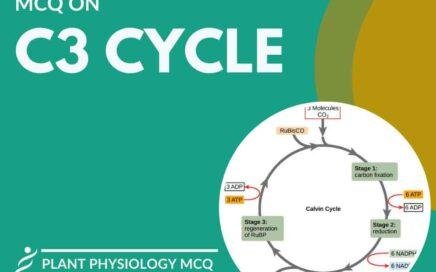
MCQ on C3 Cycle (Calvin Cycle)
The Calvin cycle, also known as the C3 cycle, is a process in photosynthesis where carbon dioxide is converted into organic compounds like glucose. It […]

The Calvin cycle, also known as the C3 cycle, is a process in photosynthesis where carbon dioxide is converted into organic compounds like glucose. It […]

Carbohydrates are organic compounds composed of carbon, hydrogen, and oxygen, typically in a 1:2:1 ratio. They serve as a primary source of energy for living […]

MCQ on Secondary Metabolites in Plants: Secondary metabolites are organic compounds not directly involved in growth or development but crucial for ecological interactions and adaptation. […]

MCQ on Phloem Transport in Plants: Phloem transport in plants occurs through a process called translocation. Sugars, mainly sucrose, produced in photosynthetic source tissues are […]

MCQ on Cell Signalling in Plants: In plants, cell signalling occurs through various mechanisms, including phytohormones like auxins, cytokinins, and gibberellins. These molecules regulate growth, […]

MCQ on Cellulose Synthesis in Plants: Cellulose is a carbohydrate (polysaccharide) composed of glucose molecules, serving as a structural component in plant cell walls. Cellulose […]

MCQ on Electron Transport System: The electron transport system, or electron transport chain (ETC), is a series of protein complexes in the inner mitochondrial membrane […]

Amino acid biosynthesis is a complex cellular process where organisms synthesize amino acids, the building blocks of proteins. It involves intricate pathways, often regulated by […]

Photophosphorylation is a biological process in photosynthesis where light energy is absorbed by chlorophyll in plant cells and converted into chemical energy. This energy is […]